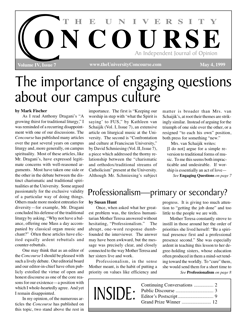Preparing students to compete in the global economy
by Peter Cole
In reply to Ben Brown’s response to my earlier letter:
I have an associates degree in liberal arts. So I definitely know what a liberal arts education entails. I am saying that the role of liberal arts education as formation is excellent and important for preserving the fundamental beliefs and principles which should be so much a part of our lives but sadly are not.
My position was and is that our education needs to have some practical application to it. That is, when graduation time comes we have to be ready compete in the global economy and be prepared to defend the Gospel. We are going to have difficulty defending the Gospel without practical training.
The core curriculum task force is looking at ways to have both liberal arts study with necessary applications as computer training, resume and cover letter writing. They are talking about ways to do this so our students will be both educated and trained. Franciscan University is both a liberal arts school and a school of professional programs.
It is academically irresponsible for someone not to take courses and/or workshops on computer literacy, resume writing, and how to do a job interview. Education for its own purpose is good when it is integrated with practical applications.
Peter Cole, MA Education program


